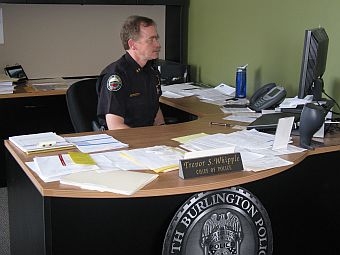Visit the Series Homepage
Vermont Reads 2011: "To Kill A Mockingbird"
 (Host) All this week VPR is taking a look at race in Vermont as part of the Vermont Humanities Council’s state-wide reading program, Vermont Reads, To Kill a Mockingbird. Today we look at the criminal justice system.
(Host) All this week VPR is taking a look at race in Vermont as part of the Vermont Humanities Council’s state-wide reading program, Vermont Reads, To Kill a Mockingbird. Today we look at the criminal justice system.
Is racial profiling happening in Vermont’s police departments? For years no one knew, because unlike other states, police departments did not track race data. But now a pilot project aims to find out.
VPR’s Mitch Wertlieb reports.
(Wertlieb) The radio crackles to life as officers on patrol check in with the dispatcher at the South Burlington police department.
Some of those calls are from officers making traffic stops. South Burlington is one of four Chittenden County police departments that voluntarily recorded data in 2009 about the people they stopped, and now it’s routine to do so.
Police Chief Trevor Whipple says that practice became a priority shortly after he arrived.
(Whipple) "There had been a meeting called it seems just weeks after I got here to address concerns about the relationship between law enforcement and the community of color. So we wanted to do something to talk about that. And to really put it on the target to say, ‘We need to work together, and figure out a plan to address this.’ Whether it be real or perceived, either way it’s a problem."
(Wertlieb) But is racial profiling actually happening? Northeastern University took the first -year of information from the South Burlington police, along with Burlington, Winooski, and the University of Vermont, and came back with a somewhat confusing answer:
The report said there was no evidence racial profiling was taking place, but that it is possible it was happening.
Jack McDevitt is the director of Northeastern’s Institute on Race and Justice. He says the study was equivocal because while nonwhite drivers weren’t stopped more, they were searched more, than white drivers.
The problem is the sample size of the survey. More than 13,000 stops were recorded, and out of those, there were only 175 searches, which McDevitt says is too small a sample to draw a conclusion. He says that drew questions from the four agencies involved in the study.
(McDevitt) "The fact that there’s so little searching going on in Vermont is a positive thing and when they search they tend to be searching people who have contraband on them, so they called back to sort of clarify what that was about and how much more data do we need to come to a conclusion?"
(Wertlieb) Back at the police station in South Burlington, Chief Trevor Whipple says he’s eager to get the next report from 2010 data, because it will includes data from the Vermont State Police. That will give researchers a much larger sample to draw from.
But beyond hard numbers, Whipple says the situation is much better now than when he started in law enforcement in the early 1980s, getting training from the Drug Enforcement Agency:
(Whipple ) "We were trained that African Americans were more probably drug traffickers than anybody else. That was one of the first things we looked for, we now know how much an error that was, so what happens is some of that past, it’s very difficult to move from."
(Wertlieb) Wanda Hines has seen that mindset shift as well since she moved to Burlington in the 1960s. Hines helped form a community activist group called Uncommon Alliance holds regular meetings with local law enforcement to improve communication between minorities and law enforcement:
(Hines) "Uncommon Alliance actually became a concept in 2005 with a couple of minority community leaders coming together, mainly African-Americans and refugee and immigrant community leadership having this discussion about racial profiling."
(Wertlieb) Hines says get-togethers are especially productive because the police are there voluntarily. She says despite the confusion over the first racial profiling report, the process is being set in motion:
(Hines) "It’s a means to an end, it’s the beginning. We have created the capacity, something we didn’t have before, a way to hold accountable local law enforcement behavior, or any perceived biased, What I’m looking forward to if anything is the report and the findings this year."
(Wertlieb) Chief Trevor Whipple is, too. And he says hopes police data will spark a community conversation about bias. He points to the high number of calls police get from store owners who report shoplifting by African-Americans, as compared to white kids in the same age group:
(Whipple) "That leads us to believe that maybe they’re being scrutinized or watched at a higher rate, so the point I’m trying to make is that we need to educate our communities to look inward look at themselves, do they have their own bias and if you’re a store owner do you react the same way when four African-Americans youth enter your store as you do when four white youth enter your store."
(Wertlieb) Whipple says he’s guided by something his Burlington counterpart– Chief Michael Schirling– reminds his officers: "The police cannot," he says, "be the instrumentality of someone else’s bias."
For VPR News, I’m Mitch Wertlieb.